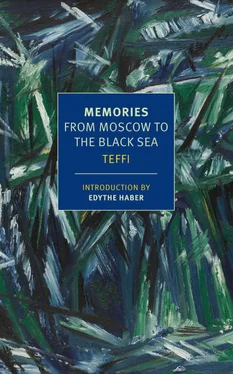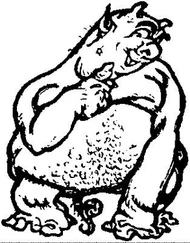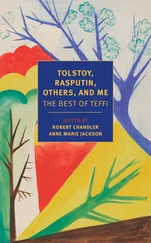Mikhail Kuzmin (1872–1936) was one of the finest poets of his time. He also wrote plays and composed music. In 1906, he published Wings , the first Russian novel with an overtly homosexual theme; two large editions sold out at once.
The Triple Entente was the alliance that, from 1907 until the end of World War I, linked France, Russia, and Great Britain—a counter-weight to the “Triple Alliance” of Germany, Austria-Hungary, and Italy. There were French forces in Odessa in early 1919, but the French intervention in Crimea and southern Ukraine was brief, badly planned, and unsuccessful (See Ivan Bunin, Cursed Days , p. 77–78, notes 2 & 3). Teffi’s characters are vainly hoping to see British or French ships bringing reinforcements to protect them from the advancing Red Army. In an article she published while still in Kiev, in December 1918, Teffi makes fun of the way people all of a sudden began excitedly talking about “pennants.” The Russian equivalent, vympel , is rarely used, and Teffi professes not to know whether it means “a rag,” “some kind of stick or pole,” or “an assistant to a ship’s captain” (Teffi, V strane vospominanii , pp. 203–06).
Ivan Bunin (1870–1953) remained in Odessa after it fell to the Bolsheviks in April 1919. The Whites, however, recaptured the city in August and Bunin was able to leave Russia in January 1920. He settled in France, where he and Teffi became close friends. In 1933 he became the first Russian to be awarded the Nobel Prize for Literature. He was married to Vera Muromtseva (1881–1961). Alexey Tolstoy (1883–1945), nicknamed the Comrade Count, was a gifted but opportunistic writer, best known for his science fiction and historical novels. He settled in Paris in 1920 but returned to the Soviet Union three years later; he was awarded a Stalin Prize three times. His wife Natalya Krandievskaya (1888–1963) was a poet and memoirist; the couple separated in 1935. Sergey Gorny (the pen name of Alexander Otsup [1882–1948]) was a poet and satirist; during the Civil War he served as an engineer in the White navy. Pyotr Nilus (1869–1943) was a Russian Impressionist painter. From 1920 he lived in Paris, initially sharing a house with Ivan Bunin. Alexander Pankratov (1871–1922) was a journalist; like Teffi, he had worked for the Russian Word .
“The Last Breakfast” is included in the appendix. And see note 71.
The soldiers’ strange words are probably derived from the Arabic Hamdullah (“Praise Allah”). As for their “fierce teeth,” Teffi uses the word kannibal’skie , which can mean “cannibalistic” but which was also used more generally in the sense of “brutish” or “savage.” People at this time tended to think of cannibalism as more widespread than it was. Russians, most of whom had little contact with sub-Saharan Africa, may have been particularly prone to this misapprehension. Our thanks to Boris Dralyuk for his help with this note.
“Your tongue will lead you to Kiev” is the Russian equivalent of the English “He who has a tongue goes to Rome.” That is, if you ask enough questions, you will receive an answer.
On April 3, 1919 the French government decided to evacuate all French troops and the city’s civilian administration. This caused widespread panic. The evacuation was largely completed by April 6, though there was probably no military necessity for such speed.
Here we are translating khlopotat’ , a common Russian word for which there is no English equivalent. Elsewhere, in passages where Teffi draws less attention to this verb, we have translated it in different ways: “apply for,” “try to obtain,” “procure,” etc. In “Moscow: the Last Days,” an article she published in Kiev in October 1918, Teffi explains the word: “Incidentally, there is no equivalent to this idiotic term khlopotat’ in any other language in the world. A foreigner will say, ‘I’ll go and get the documents.’ A Russian, ‘I must hurry and start to khlopotat’ with regard to the documents.’ The foreigner will go to the appropriate institution and obtain what he needs. The Russian will go to three people he knows for advice, to two more who can ‘pull strings’, then to the institution—but it’ll be the wrong one—then to the right institution—but he’ll keep on knocking at the wrong doors until it’s too late. Then he’ll start everything all over again and, when he’s finally brought everything to a conclusion, he’ll leave the documents in a cab. This whole process is what is described by the word khlopotat’ . Such work, if carried out on behalf of a third party, is highly valued and well paid” ( Teffi v strane vospominanii , pp. 167–70).
Alexander Kugel (1864–1928) was a critic. In 1908 he co-founded The Crooked Mirror, a Petersburg theater that specialized in parodies and put on two of Teffi’s plays. He remained in the Soviet Union, still directing this theater, till his death.
Not as nonsensical as one might think. Some French units did indeed refuse to fight the Bolsheviks and there were revolutionary movements on board some of the ships: http://militera.lib.ru/h/civilwar_black-sea/02.html.
Founded in 1436 on an archipelago in the White Sea, the Solovetsky monastery was for many centuries the most important monastery in northern Russia. In 1923 the Soviet authorities turned it into a special prison and labor camp—the prototype for the vast system later known as the Gulag. Teffi visited the monastery in summer 1916 (Haber, chapter 6).
Known as the Angel of Blessings, Barachiel is often portrayed holding a white rose against his chest, or with rose petals scattered on his cloak; the petals symbolize the blessings he bestows.
Prayer belts are wide belts with the words of prayers woven into them, intended to be worn or to be hung on the wall.
The True Cross was thought to have been made of pine, cedar, and cypress; more generally, cypress is one of the oldest symbols of mourning. The Solovki monastery and the Pechersk Lavra, the cave monastery in Kiev to which Teffi says goodbye in chapter 12, were the two most important of all Russian Orthodox pilgrimage sites. That Teffi tells us about devotional objects from each site is significant; the tiny icon in a bottle from the Lavra and this cypress cross are almost the only personal possessions she describes in Memories —an embodiment of the Holy Russia she would never see again. Her story “Solovki” (first published in émigré journals in 1921 and republished in the 1924 volume Evening Day ) was important to her; she considered it one of her best (See N.A Teffi, Nezhivoy Zver’ (Moscow: Lakom, 1999), p. 9).
The engineer “V” was in reality Alexander Otsup, see note 85. He and Teffi remained close friends until his death. In a letter to Teffi (February 5, 1948) he refers to their meetings in Kiev in late 1918—in particular to Teffi’s bout of Spanish influenza—and to this last day in Odessa. For the most part, his account tallies with Teffi’s. http://kfinkelshteyn.narod.ru/Literat/O_Sergee_Gornom.htm#prim30.
Lermontov, “The Ghost Ship.”
“Ataman” Nikifor Grigoriev (1885–1919) had earlier fought on the side of Petlyura and the Directorate, but by 1919 he had allied with the Bolsheviks. He captured Odessa only a few days after the French evacuation.
Читать дальше












